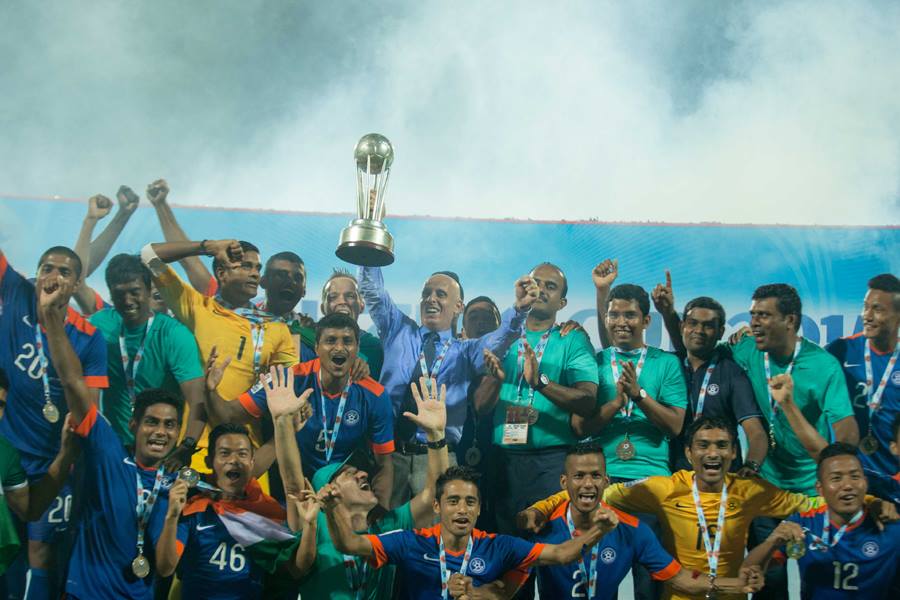Stephen Constantine’s Mission India – Is there still time to write large in history books?
When Stephen Constantine took charge in February last year, the team was languishing at 171st position in the ranking table. One year has gone by and the team is now at 163. Evidently, nothing much has changed on the ranking front. But look underneath the disappointing numbers, and you see that the young Indian team, under Constantine’s guidance, has taken giant steps to script a new era.

The Englishman’s second stint with the Indian national team has been marred by inconsistency, much like his first tenure from 2002-05. Yet, it would be rather early and too cynical to draw a decisive conclusion on whether his second homecoming would fizzle out, in the same way, the first one did. For much has changed since his departure in 2005, and the 53-year old Englishman is now a veteran of quite a few coaching stints across the globe.
It is perhaps his preceding assignment with the Rwandan national team that brings forward the strongest evidence of his ability to turn things around and to initiate a positive change. When Constantine took over the reins of the central African nation's football team in May 2014, the Amavubis – as they are called – were ranked 131st in the world and were often considered a mere pushover in the region. It was a tricky task at hand, and it was particularly difficult to build a team that could challenge Africa’s top elites. However, his methodology did pay dividends, and his authoritative approach was eventually enough to bring the best out of the players.
“Sometimes you can be misunderstood for being the mzungu or the “white man” coming in and telling you what to do” – Constantine had then confessed in an interview with The Guardian. Yet, he managed to carve out a working relationship with the country’s federation and had earned their willingness to implement his ideas. The result showed and they soon reached their highest-ever ranking of 68 by the end of December, with memorable victories over the likes of Libya, Congo and Gabon. What worked for him was perhaps his relentless effort to fight for the welfare of his players; to provide them with the best conditions possible.
Incidentally, Rwanda was a team, India had comfortably beaten during Constantine’s first tenure in the country, en route to their silver medal finish in the inaugural Afro-Asian games in 2003. That in itself speaks volumes of Rwanda’s rapid progress.
Back in India, Constantine strategically brought in a backroom staff that had shared a very close relationship with him in the past - Shanmugam Venkatesh as assistant manager, a former Indian International who had previously played under the Englishman and his close aide from Rwanda, Lee Thompson as assistant coach, a 33-year old from England who has had coaching stints with the youth academies of Chelsea and Crystal Palace.
Having been drawn into a tough group, with the likes of Iran, Turkmenistan, Oman and Guam, a string of five losses followed, including an embarrassing 1-2 loss against lowly-ranked Guam, which blew up any World Cup aspirations the Blue Tigers had nurtured. The performances were certainly below par, but realistically, World Cup qualification was perhaps never on the cards anyway, and it was a run of results that the team could – albeit the disappointment - put behind them. After edging past Guam in the home encounter, India’s hopes now are solely directed at the Asian cup qualification.
Constantine’s mettle to drive this Indian team on to the qualification would be the sternest test he would face as yet. The Asian Cup qualification would be an achievement in itself – given the nation has only managed to qualify for the event thrice – but fulfilling that dream hangs tantalizingly in the balance.
Meanwhile, India’s successful reclaim of the SAFF Championships this month, would add momentum to the cause, but in all probability, what lies ahead would go on to define Constantine’s legacy in Indian football.
While Constantine’s reign so far has brought in a lot of criticism, the onus now lies with the AIFF to stick with their choice and back him in his decisions. While an alternate school of thought might advertise an idea to be “pro-active” and call for a change while there is still time, the remedy for Indian football lies in the long term. The board must have the patience and willingness to work with the coach and develop a proper working condition for him to help him finish what he has already started. And therein lies India’s best bet to recover lost grounds.
There's not enough time to look back and once again start from the scratch. The time to re-assess would come at a later stage.
But what exactly is it that he has ‘started’? Well, one of the first steps that Constantine had emphasized on during his initial days was the establishment of an effective scouting network. The scouting scene in India has thus far been somewhere between primitive to non-existent. Encouragingly the board did realize that too, and a new scouting network plan designed by Constantine was put forward in May last year. The ambitious project involved the participation of various regional scouts in identifying talents for the national team.
Constantine also tried to ensure that the scouts have in some capacity worked with him in the past, so that they remain in a better position to understand the coach’s philosophy. Interestingly again, Abhishek Yadav, who played under Constantine during his first stint in India, was appointed the Director of scouting. In fact, Yadav was perhaps the most pivotal figure of Constantine’s greatest moment as the Indian coach – his decisive golden goal winner in the 2002 LG Cup against Vietnam ushered nationwide joy and marked a rare bright spot for Indian football in the early part of the last decade.
Nevertheless, the scouting initiative would also go on to help India in their historical 2017 U-17 World Cup campaign – in what would be the nation’s first participation in a football world cup. This brainchild of Constantine would see a team of scouts – mostly consisting of former Indian players – operate in not less than 29 Indian states, in order to locate talents in the region and then report back to the centralized authority.
While Constantine's inclination towards infusing fresh talent is visible with the introduction of the scouting system, more evident is the fact that the national team has seen as many as 17 debutantes in the past year, most notably Lallianzuala Chhangte of Mizoram – a product of Liverpool’s youth academy in India – who debuted with a brace against Nepal in India’s successful SAFF Championship campaign.
It is difficult to ascertain the future of Indian football, given the disorganised state of the domestic league structure. In the midst of the glitz and glamour of the Indian Super League (ISL) and the barren I-League, Constantine has been critical of India’s two-league structure and has periodically asserted that it is impossible to assemble a national team from two different leagues. He has also been a strong advocate of re-scheduling the league structure according to the FIFA calendar and has not been shy of taking on the AIFF on this matter. The change would allow the players to be part of pre-season by June-July and be on prime fitness levels by September-October – around the same time the various qualification campaigns generally begin. It would also allow India to participate in the various international friendlies on FIFA dates without causing conflict in the club interest.
Constantine’s argument certainly holds weight, even so more when you consider the fact that other successful teams in Asia, including the likes of Iran, Japan and China, have too done the same.
There’s no doubt that Indian football has come out of the ‘stagnancy’ it had been facing for the past few decades, but it is imperative not only to work out and initiate a long term plan but also to effectively stick with it and work towards its progress. And that is where it is important for the national team coach, the board and the domestic clubs to co-exist and develop a healthy working relationship.
Stephen Constantine might have had an indifferent start to his second stint in India, but as fate has it, he still has time to write large in the India’s footballing history. A gruelling but successful scramble for a spot in the 2019 Asian Cup might just be the shot in the arm. As they say, all’s well that ends well!
(Read: An open letter to Nita Ambani from an Indian football fan)

Comments
Sign up or log in to your account to leave comments and reactions
0 Comments